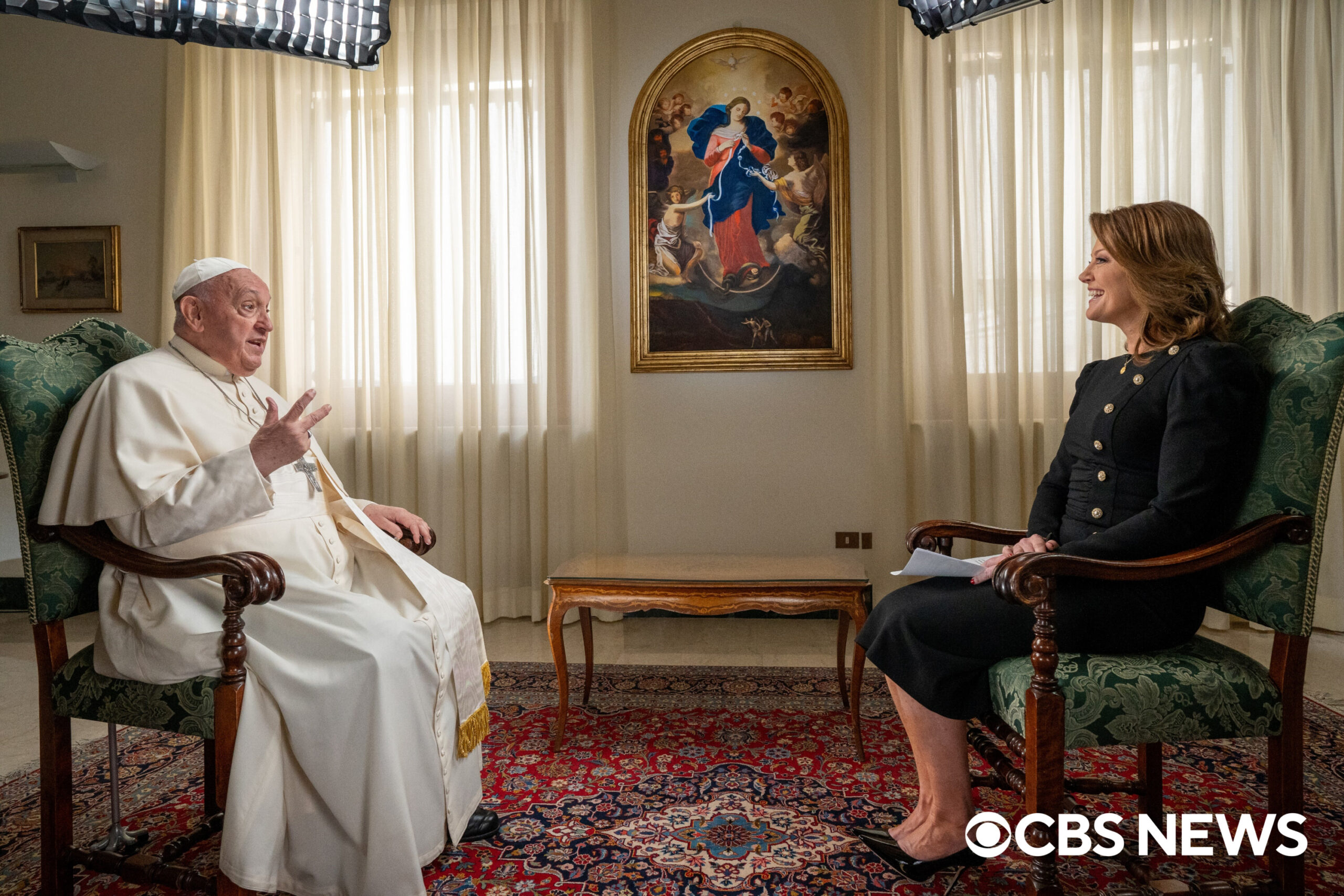Pope Francis, in an extended on-camera interview with “60 Minutes,” defended his decision allowing priests to bless same-sex couples, while reiterating that the blessing is approved for individuals and not the union itself.
“Some people were scandalized by this, but why? Everyone, everyone,” the pope said, echoing a familiar and welcoming refrain that has become a key theme of his pontificate.
Last December, Francis released “Fiducia Supplicans,” a document that said priests could bless same-sex couples, provided the blessings meet several criteria that would differentiate them from a traditional marital blessing. That document was greeted warmly by many LGBTQ Catholics, but provoked controversy in some quarters of the church.
In the CBS interview, Pope Francis repeated the nuance that accompanied the original declaration.
“What I allowed was not to bless the union,” said the pope to Norah O’Donnell, the anchor of the CBS Evening News, in an interview aired May 19.
“What I allowed was not to bless the union,” said the pope to Norah O’Donnell, the anchor of the CBS Evening News, in an interview aired May 19. “That cannot be done because that is not the sacrament [of matrimony].”
Ms. O’Donnell, who was raised Catholic and graduated from Georgetown University, spoke with Francis for more than an hour at Casa Santa Marta, the Vatican guest house where the pope lives. Part of the interview aired on the CBS Evening News on April 24, and the network will air a one-hour special with more of the pope’s remarks Monday evening.
Francis’s efforts to avoid doctrinal rigidity have been met with a broad array of reactions during his more than 10 years at pontiff. The release of “Fiducia” by the Dicastery for the Doctrine of the Faith was met with both praise and criticism, with some lauding the document as “a significant victory” for LGBTQ Catholics and others falting it as confusing and ambiguous.
Some U.S. church leaders greeted the declaration when it was announced, including Cardinal Blase Cupich, the archbishop of Chicago, who embraced the document as “a step forward.” But many dioceses, including Boston, Green Bay and Crookston, Minn., emphasized that church doctrine on traditional marriage had not changed, and Archbishop Salvatore J. Cordileone of San Francisco gave diocesan priests permission to deny same-sex blessings to prevent “scandal.”
In response to a question from Ms. O’Donnell about “conservative” U.S. bishops who have long criticized him, Francis delivered a blunt assessment of their positions.
[A] conservative is one who clings to something, and does not want to see beyond that. It is a suicidal attitude, because one thing is to take tradition into account, to consider situations from the past, but quite another is to be closed up inside a dogmatic box.
The “60 Minutes” interview with Francis, a first for a U.S. television network, covered a wide range of topics, including the pope’s appeals for a negotiated peace in the Middle East, his plea to welcome migrants regardless of their immigration status, his “zero tolerance” policy for addressing cases of child sexual abuse by clergy members and his rejection of surrogacy and women’s ordination. His critique of surrogacy stems from his opposition to the practice as “a business,” and the pope suggests adoption for couples instead.
Francis’s efforts to avoid doctrinal rigidity have been met with a broad array of reactions during his more than 10 years at pontiff.
Francis also spoke of “the globalization of indifference,” when people become numb to the suffering of others or “wash their hands” of all responsibility, like Pontius Pilate. “Please, we have to get our hearts to feel again,” he implored.
Yet despite an abundance of conflicts and tragedies around the world, the pope expressed hope in what he views as the basic decency of all humanity. “We are all fundamentally good,” he said. “Yes, there are some rogues and sinners, but the heart itself is good.”
During the “60 Minutes” interview, Francis also renewed his support for the global decriminalization of homosexuality, which he called “a human fact.” Speaking in January 2023 with the Associated Press, Francis called laws that persecute LGBTQ people “unjust” and urged the world’s bishops to oppose them. In a letter to Outreach, he expanded upon his initial remarks, describing all sexual acts outside of marriage as sinful but stating the pastors should “consider the circumstances” in each case.




